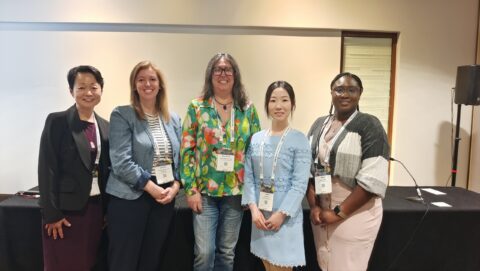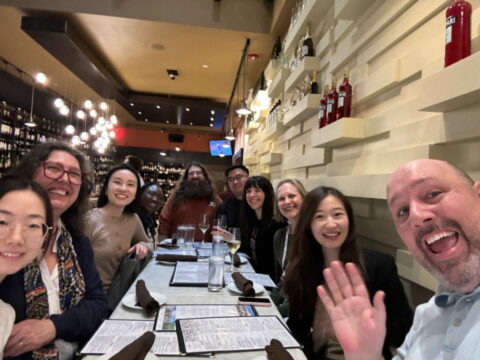Written by Marcie Kamb, June 5, 2024
The 2024 American Educational Research Association (AERA) conference in Philadelphia, with its theme of Dismantling Racial Injustice and Constructing Educational Possibilities, provided a platform for scholars from the Center on Education and Training for Employment to showcase research that not only advances knowledge in their respective fields but also contributes to addressing societal challenges related to racial injustice and educational equity.
One of the key presentations focused on the role of learning analytics in K-12 education, presented by Mimi Adjei and Ana-Paula Correia. Their research sheds light on how learning analytics can enhance academic achievement, engagement, and satisfaction among K-12 students, particularly those from marginalized communities. Educators and policymakers can create more inclusive and equitable learning environments by understanding and implementing effective learning analytics strategies.

Fan Xu and Ana-Paula Correia’s study on pair programming in middle schools is another example of research with significant societal implications. By exploring the impact of individual factors on students’ computational thinking performance, the study highlights the importance of inclusive educational practices that consider students’ diverse backgrounds and experiences. This research has the potential to inform teaching practices that promote equity and access to high-quality education for all students.
Hadley Bachman and Karen Stansberry Beard’s research on educators’ family engagement efficacy beliefs is also crucial in the context of dismantling racial injustice. The Family Engagement Efficacy Beliefs of Educators (FEEB-E) scale provides educators and policymakers with a tool to assess and improve family engagement practices, which are essential for creating supportive and inclusive school environments, particularly for marginalized communities.
Hadley Bachman shares “Understanding the beliefs our educators hold about their capabilities for engaging with parents and caregivers is a powerful starting point for designing tailored learning experiences. Unfortunately, most professional development for teachers overlooks this crucial aspect, opting for a one-size-fits-all approach. However, with a tool like the FEEB-E, school administrators, policymakers, and researchers can identify educators’ strengths and areas for improvement, paving the way for more impactful professional learning opportunities. In this way, we can create meaningful progress toward equitable family engagement benefitting all children.”
Sean Hickey’s study on instructional design decisions addresses the need for effective workplace learning strategies in a rapidly evolving technological landscape. By understanding how instructional designers interpret learning theories and apply them in practice, organizations can develop more effective training programs that promote diversity, equity, and inclusion in the workforce.

Sangeun Lee’s research on factors influencing Indicator 8 in special education emphasizes the importance of considering individual and school district variables in promoting family engagement. This research has the potential to inform policy and practice in special education, ensuring that all families, including those from racially and ethnically diverse backgrounds, are engaged and supported in their children’s education.
Jiarui Xie, shared a study on instructor participation in asynchronous online discussions highlighting the importance of inclusive teaching practices in online learning environments. By comparing different approaches to instructor participation, the research provides insights into how educators can promote student engagement and learning outcomes, particularly for students from underrepresented backgrounds. Jiarui reflects on her experience as a first-time attendee at the conference. “I had a fantastic experience at AERA. It was the largest conference I have ever attended, covering an array of topics. Not only did I have the opportunity to present my team’s research, but I also had the privilege of attending numerous enriching presentations on topics such as asynchronous online discussion, self-regulated learning, and artificial intelligence. Furthermore, I had the chance to connect with fellow scholars, expanding my professional network in the process.”
Additionally, Barbara Boone and Thomas Capretta represented CETE’s Family Engagement program by presenting at the 21st annual Roundtable of the International Network on School, Family, and Community Partnerships. Every other year, this international meeting of researchers who study family and community engagement meets at the AERA annual meeeting to enable researchers to disseminate their work and progress.
Overall, the research presented by scholars from the Center on Education and Training for Employment at the 2024 AERA conference demonstrates a commitment to advancing equity and opportunity in education. By addressing key challenges related to racial injustice and educational equity, these scholars are contributing to a more inclusive and equitable society.
